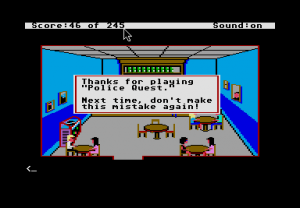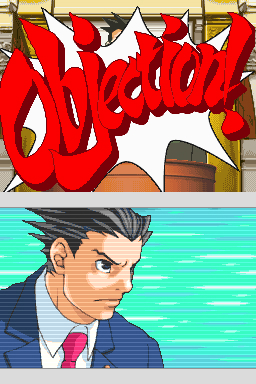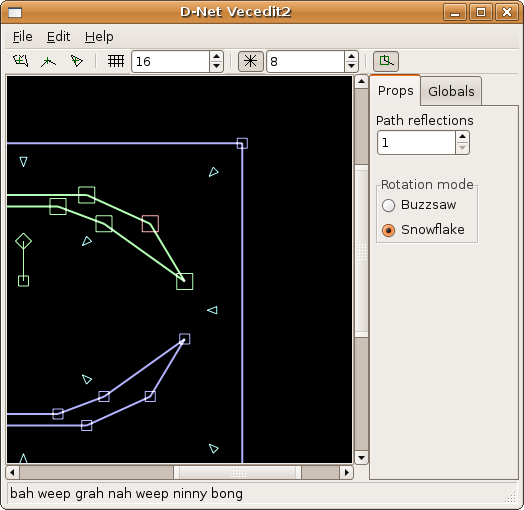Phoenix Wright: Justice for All dissection
2008, June 20th 1:54 PM Phoenix Wright: Justice for All
Phoenix Wright: Justice for All
Developer: Capcom
Completion level: Finished game
Spoilers: Plotline may be spoiled. Sorry. Finish the game first.
Many many years ago, there was a developer named Sierra, who made adventure games.
You played a character (and oh boy, some of them were Characters) who wandered throughout a world, usually a strange, bizarre, twisted world, generally with some goal in mind. (Not always with a goal in mind.) You collected random items as you went and jammed them in your inventory. There were puzzles. You solved puzzles, frequently using your inventory, the "plot" continued, and the games were well-received and quite enjoyed at the time.
In retrospect, most of the old Sierra games were terrible.
I don't mean the graphics weren't up to our current standards, because obviously they weren't, we're talking really old games. I mean the gameplay was atrocious. The games penalized you for exploring (by dying), they penalized you for logical deduction (by dying), they penalized you for taking a reasonable approach to the problems (by dying), and even if you somehow managed to pass all the hurdles and read the developer's mind you would still frequently end up in a spot where you couldn't possibly finish the game . . . with no way of knowing that you were stuck. And when I say "read the developer's mind", I really do mean "read the developer's mind" – puzzles were byzantine at best, and at worst they were an exercise in surrealism that has rarely been matched since.

Adventure games got more and more complicated, increasingly weird and unsolvable, and nobody realized it. Hell, I didn't realize it at the time – I loved those games, and it's only looking back on them that I realize how much sheer frustration and guesswork went into playing them. People stopped buying them, they died a grisly protracted death, and considering that Sierra was responsible for much of the genre at that point, I place most of that responsibility squarely on Sierra. Adventure games became entertainment non grata in the industry, and roleplaying games sort of awkwardly shuffled into the niche that adventure games had previously filled.
Many many many many many years ago, there was a developer called Infocom. They made "interactive fiction" games. You had an inventory, you solved puzzles, the puzzles got increasingly complicated and byzantine over time . . . you see where this is going?
Infocom doesn't exist anymore.
Yeah, I bet you did see where that was going.
Phoenix Wright is a game about a defense attorney.
Each game is broken up into four or five independent cases. At the beginning of the game, someone is murdered. Someone else will be accused of murder. You defend that person.
The gameplay consists of two segments, which often repeat several times within a case. Occasionally, you'll be in court, picking holes in the witnesses' testimonies, using court evidence and their own words to ferret out the truth. This is amazingly fun. The developers did a wonderful job of making it suspenseful, through music, dialogue, and fabulous art. Alternatively, you might have to inspect the crime scene, interview witnesses, interview people who you can call to the witness stand, etc etc. This part isn't quite as fun, for me at least, but it's still damn entertaining and it makes the first part all the better.
 |
"I've never held any sort of weapon. I've never even touched one!" "OBJECTION! Why are your fingerprints on this sword, then?" "Where . . . where did you get that? That . . . it must be a mistake!" "From a broken locker . . . behind your car. With your fingerprints on the lock!" "Nooooooo!" |
Phoenix Wright puts a lot of work into ensuring that you can't get yourself stuck. For example, there's no "I'm done, go to court!" button – if there's stuff left to discover, then you keep wandering around until there isn't. If there isn't, you go to court immediately. The same philosophy works its way into the entire game. If you've discovered all you can from a witness, the cross-examination ends. If you haven't, it doesn't. At all points, you know you have what you need to finish the next segment, because if you didn't have it, you wouldn't be here.
The end result of this is that, generally, it's obvious what you're supposed to do. Either you need to wander around the game world a bit more and look for more clues, or you need to find a contradiction in what the witness is saying right now. The upside to this is that it pushes you along in the game at a reasonably nice clip. The downside is that the game becomes rather linear, which exacerbated by the occasional "false choice" – you're given a choice, yet all the choices lead to the same path. Still, the writing is skillful enough that you usually don't notice these unless you're watching for them or replaying the game (and, let's be honest here, these games have zero replayability.)
The game almost pulls everything off flawlessly, and if I was writing about the first game in the series, I'd say it did – because the first game did. I ran into some trouble in this game, and it worries me.
Basically, the cases are getting more complicated.
There's more stuff going on. There's more surrealism. The puzzles aren't byzantine yet . . . but they're sort of nudging around the edges of it. They're considering it. If I was a history major you'd be getting a cute historical joke involving "not being byzantine yet", but I'm not, so just pretend there's one here.
This creates some issues with the linear Phoenix Wright gameplay – namely, that you can occasionally logic things out better than Phoenix did, and you get penalized for it. And sometimes, even though you know exactly what you want to say, you can't figure out how to say it within the confines of the game.

I'm going to spoil the hell out of the third case here, so, y'know, consider yourself warned.
The third case takes place in a circus. The ringmaster was found dead, the magician is a suspect, you're defending the magician, blah blah blah. The real criminal is the acrobat, and at a late point in the game you've figured out that he had both motive and opportunity, but you're still pinning down the details on how it happened.
Well, I wasn't pinning down the details. I'd figured it out. His pet monkey helped him. (This is not abnormal in a Phoenix Wright game.) So when the judge asked if the acrobat had an accomplice . . . well, yeah, he did. It was the monkey. Duh.
But you're not supposed to realize this at that point in the game. Despite being right, that was the wrong answer. I was not conforming to the exact pattern they wanted, and the game penalized me for it, and I had to work gradually through the guesswork they wanted me to guess at . . . eventually coming to the conclusion that, hey, the monkey helped him. The entire process was extraordinarily difficult, as it's very hard to figure out what they want you to say when, in fact, you know the right answer but aren't supposed to.
In a game like this it is vital to playtest thoroughly – ridiculously thoroughly – so you can see where people get stuck, and where people think too much and come up with an answer they're not yet supposed to have, and figure out how to design the game so that neither of those are a problem. And this is really really hard, especially when you're trying to make a game which is essentially linear.
There's two more games in the series that I haven't played yet (okay, the most recent one is Ace Apollo, not Phoenix Wright, but it's still the same series) and at least one spinoff being produced. It is entirely possible that they've recognized and fixed the problem by then.
But it's also possible they haven't. And this worries me, quite a bit. We're finally rejuvenating the old adventure game genre, after Infocom damaged it and Sierra did its best to finish the genre off. It's a good genre. There's a lot of fun to be had, there's a lot of entertainment, and I don't want to see it gone . . . but it's also a genre that's very easy to do badly, and very hard to do well, and painfully hard to tell the difference.
Still, I'm looking forward to the next game. We'll see.

 Time for another release!
Time for another release!